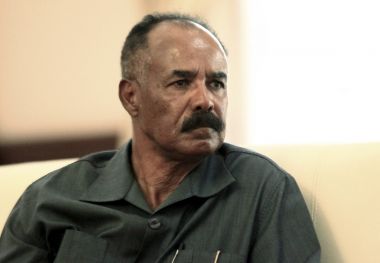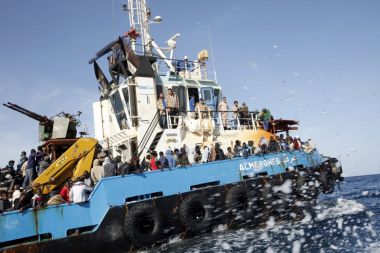Eritrea: 'Systematic, widespread gross human rights violations'

Eritrea was this week accused by the UN of "systematic, widespread and gross human rights violations", including the failure to protect the freedom of religion or belief.
A year-long inquiry into human rights in the country found the "systematic violation of an array of human rights on a scope and scale seldom witnessed elsewhere in the world." Located in the horn of Africa, Eritrea is run under a one party political system – President Isaias Afwerki of the People's Front for Democracy and Justice party has been in power since independence in 1993, and the formation of other political groups is forbidden.
An editorial in the Guardian branded Afwerki's rule "a dictatorship that sounds close to being Africa's equivalent of North Korea", and the UN Commission's damning report criticised the country's "pervasive control system used in absolute arbitrariness to keep the population in a state of permanent anxiety".
"In its determination to safeguard its own continued existence, the Government has proceeded to establish a system by which individuals in society are silenced and isolated through the organized repression of the freedoms of opinion, expression, assembly, association and religion," the report states.
"Pervasive control systems and heavy consequences for perceived deviant behaviours...have created an environment of self-censorship whereby individuals no longer trust anyone – not even their own family."
The plight of Eritreans has come to international attention in the past few weeks in particular as the migrant crisis intensifies. Statistics show that they are the second largest group to cross the Mediterranean in the hopes of a better life in Europe.
It recently emerged that around 86 Eritreans were kidnapped by Islamic State militants in Libya as they attempted to make the perilous journey. They were taken in a dawn raid on June 3 while travelling in a truck to Tripoli. It is feared that they may have already been killed.
Dr Khataza Gondwe, team leader for Africa and the Middle East at Christian Solidarity Worldwide, said the UN's latest report on Eritrea should be "a wakeup call" to the horrendous situation its citizens are living under.
"The largest group [of migrants] are from Syria, where there is a horrific civil war. Eritrea has a population about the size of London or smaller, and it's producing the second largest amount of refugees, which in itself is a warning sign," she told Christian Today.
Those trying to escape the country face incredible obstacles before they even reach the sea. Eritrea has a shoot-to-kill border policy, there's a real danger of being kidnapped from the UN camps in Sudan, or being held for ransom, beaten and tortured by people traffickers in the Sinai Desert. "And now you have the crisis in Libya where several Eritreans were executed by ISIS...[but] despite knowing all these things occur, they are still leaving Eritrea which...is an indication of the kind of situation [they are facing]," Gondwe said.

The UN's report "confirmed what we knew already," she added. "But when it's put together and in a comprehensive document it hits you afresh... nobody can refute [it]."
The sheer brutality of the Eritrean government is shocking. According to the UN Commission, "the rights of adherents to liberty and fair trial and not to be tortured or subjected to degrading treatment or punishment are regularly violated."
"The brutality that is meted out on those deemed to have committed even the slightest infractions is unbelievable," Gondwe said. She shared stories of women beaten around the womb in an effort to make sure they couldn't have children, and one woman whose womb prolapsed as a result. The situation is often even worse for those in the enforced military service, she added. "People are beaten, imprisoned in makeshift facilities, and tortured. The saddest thing is that young girls are subject to sexual exploitation and slavery, particularly by senior military officers."
One testimony Gondwe heard involved girls being lined up and chosen by officers, one by one, to be raped. "The poor girls either had to resist these advances, in which case they were punished brutally, or had no choice but to give in," she said. "Once they were pregnant, they were dispensed. It's horrific, and I don't think we've even heard the half of the violations underway in Eritrea. I fear there's still more to be uncovered, and by stating that crimes against humanity may be underway... the Commission report is hinting at the need for further investigations."
Though human rights abuses affect almost everyone except the powerful elite in Eritrea, people of faith are at particular risk. In May 2002, the government announced that it formally recognised just four religious denominations: the Orthodox Church, which is the largest Christian community in the country, the Catholic Church, the Evangelical Lutheran Church and Sunni Islam. Every other group was told to apply for registration, and had to adhere to very stringent terms. Over a decade later, and not a single further denomination has been accredited.
"A lot of groups did not file registration forms because they felt they would be used later to target Christians more easily, and that's exactly what happened," Gondwe said. "It was clearly just a ruse."
Those believed to be part of any religious group not recognised by the government are considered dangerous, and Gondwe said that over the years there have been waves of mass arrests. Much of the Church is now underground, so incidents are infrequent, but they do happen.
According to the UN, even those religious communities that are accredited are "nevertheless to varying degrees targeted by restrictions and attacks by the Government."
"Interference in religious structures and affairs is rampant," the report says. "Religious materials are confiscated. Adherents are arbitrarily arrested, ill-treated or subjected to torture during their detention, and prisoners are coerced to recant their faith. Many religious followers have been killed or have disappeared."
Gondwe confirmed that those who are arrested are forced to deny their faith, and said that priests who supported the previous Patriarch of the Orthodox Church (who has been under house arrest since 2007) have been imprisoned or forced into the military.
She said she met a group of Eritrean Orthodox monks in Ethiopia last year who had been forced to flee after the government took over their monastery and demanded huge sums of money. "They decided the best option was to leave the country," she explained. CSW is awaiting confirmation of reports that monasteries are now being torn down.
The UN Commission concluded that the Eritrean government "perceives religion as a threat to its existence and has set about controlling it and its expressions."
"I'd say that anybody who is seen as being different will be made to suffer badly," Gondwe said.
"The ruling party is a former liberation movement, where the party and its leader are all important. So anybody who is seen or deemed not to be 100 per cent behind it, and even some of those who are, is in danger. In terms of religion, religious people are specifically targeted because of that decree.
"They are seen as a problem because allegiance to a deity appears to be perceived to be in competition with allegiance to party, leader and nation, when in reality, one in no way cancels out the other."











